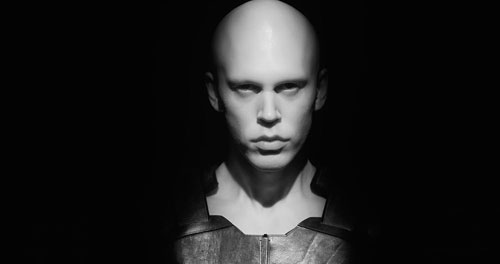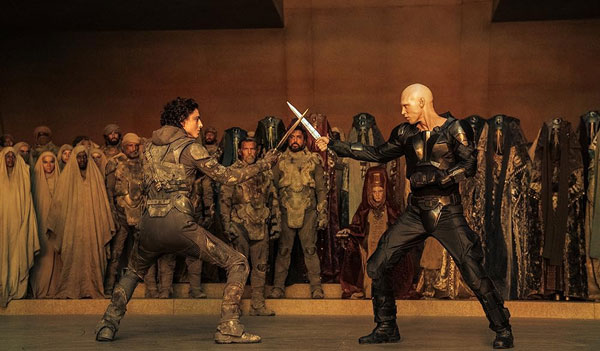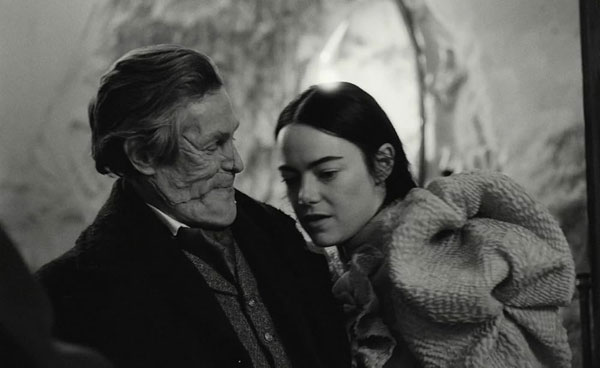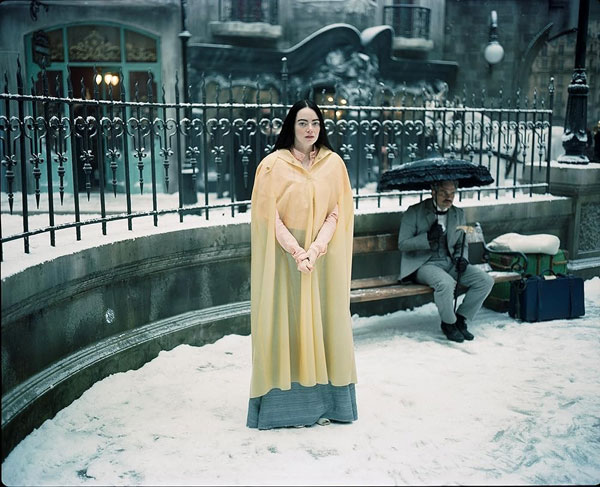|
Two
renowned recent
films, each in its
way an extravagant
fantasy, offer
protagonists who
must forge paths
through worlds
that present
daunting
perils. Paul
Atreides (Timothee
Chalamet), lead
character of Denis
Villeneuve’s Dune: Part Two, already
has suffered much
in the vicious
interplanetary
society he
inhabits; his
further exploits
set him up to
become the leader
of
it. Conversely,
Bella Baxter (Emma
Stone), heroine of
Yorgos
Lanthimos’ Poor Things, enters Victorian England as a tabula rasa, but
her innocence
confounds the
human predators
who surround her,
and she learns
quickly how to
rout them.
Adapted from Frank Herbert’s novel by Villeneuve and Jon Spaihts, Dune:
Part Two picks
up where the first
part left off,
with House
Atreides
destroyed, Paul
and his mother
Lady Jessica
(Rebecca Ferguson)
stranded on the
desert planet of
Arrakis, and House
Harkonnen in total
control of
Arrakis’
priceless spice
fields.
(Spice, part
rocket fuel and
part psychotropic
drug, is the most
valuable commodity
in the Dune universe,
and might
reasonably be
described as the
story’s
McGuffin.)
Paul and Lady
Jessica must
shelter with the
Fremen rebels in
the farthest
reaches of the
desert, where they
must quickly learn
the Fremen
language and
customs on pain of
death.
Complicating
matters is that
Stilgar (Javier
Bardem), leader of
the Fremen, is
convinced that
Paul is the
messiah foretold
in the Fremen
religion.
(When Paul denies
being the messiah,
Stilgar exults
that he’s
too humble to
admit it.)
Chani (Zendaya), a
young Fremen
warrior,
isn’t buying
any of it.
“If you want
to control people,
tell them a
messiah’s
coming,” she
says.
“And
they’ll
wait. And
wait.”
Paul and Chani
eventually fall in
love, but that
does not make her
any less skeptical.

Meanwhile, the evil Harkonnens are reveling in their control of Arrakis and
their new favor with the scheming Emperor Shaddam (Christopher
Walken). Baron Vladimir (Stellan Skarsgard) finds his nephew Rabban
(Dave Bautista) a disappointment, so instead he selects his other nephew
Feyd-Rautha (Austin Butler), who makes Caligula look like Mister Rogers,
as his successor. Gaius Helen Mohiam (Charlotte Rampling), leader of the
powerful Bene Gesserit sisterhood, thinks Feyd-Rautha can rid the empire
of Paul Atreides for good. Lady Jessica, herself a Bene Gesserit, seeks to
use her powers to protect her son and salvage what’s left of House Atreides.
This is the barest sketch of Dune: Part Two. a film whose story can fairly
be described as Byzantine. Fans of the books already know the story; those
who have not read them should know as few details as possible going in, all
the better to preserve the engrossing intricacies of the plot. Freed from the
necessary exposition in the first installment, Villeneuve and Spaihts
concentrate on establishing the characters and presenting the convoluted
rules that govern and shape them. As fantastic as those rules seem, they
make the Dune saga fundamentally more serious than Star Wars, Star
Trek or the Marvel Cinematic Universe, posing religious, political and
environmental questions that resonate uncomfortably in our own world.
Dune: Part Two is as visually resplendent as its predecessor, portraying
the bleak beauty of Arrakis’ sand dunes like an otherworldly Lawrence of
Arabia. The battle and fight scenes are even more thrilling than in Part
One, because we have a firmer grasp of who these people are and what this
society is. The entire technical crew deserves to take a bow, including
cinematographer Greig Fraser, editor Joe Walker, production designer
Patrice Vermette, composer Hans Zimmer and the usual multiple
truckloads of special effects wizards.

Dune: Part Two is not the sort of film that gains much attention for its
acting, but all the members of the stellar cast perform impeccably.
Chalamet gives a rousing, rally-the-troops speech toward the end; it
reminds me that he once played Henry V in a bastardized version of
Shakespeare, and it makes me wish he could do the part as the Bard wrote
it, including the St. Crispin’s Day speech. Butler is sublimely creepy as
Feyd-Rautha, his pretty features twisted into a sneer beneath a shaven
head. Zendaya’s Chani is the most touching character, torn between her
ideals and a love she can never have.
As of this writing, Villeneuve has tentative plans for a third Dune movie. I
understand from Dune aficionados that the next part of the story
concentrates less on battle and more on political intrigue. The ending of Dune: Part Two certainly sets up the potential for a sequel, and I’m sure
I’m not alone in being interested in what comes next.
Unlike Dune: Part Two, Poor Things ostensibly takes place on Earth,
roughly 130 years ago. Visually, there is very little in the film that anyone
would recognize as being of our world. But Lanthimos and screenwriter
Tony McNamara, adapting Alasdair Gray’s novel, create a film that
resonates in the real world--part horror dramedy, part philosophical
treatise and part feminist anthem.
Poor Things begins with the startling image of a young woman in an
electric blue gown jumping from Tower Bridge. The next scene is in black
and white, in the home of surgeon Godwin “God” Baxter (Willem Dafoe)—a
place that, like its owner, reminds us of both Dr. Jekyll and Dr.
Frankenstein.

Dr. Baxter—a monstrous apparition who looks as if he were stitched
together from spare parts in the morgue—shares his house with a young
woman named Bella (Emma Stone) and the most alarming mutant animals
since Phil Kaufman’s version of Invasion of the Body Snatchers. All the
animals are the products of Dr. Baxter’s laboratory, and so, indeed, is
Bella—she is the woman who leapt from the bridge, reanimated with the
brain of her unborn child.
Bella is to all appearances a grown woman, but her motor and social skills
are infantile, as is her moral sense. She moves with the jerkiness of a
toddler; she demands the slaughter of pets; in Dr. Baxter’s laboratory, she
fondles the private parts of corpses prepared for dissection, then stabs out
their eyes. She slaps new acquaintances, such as Dr. Baxter’s assistant Max
McCandles (Ramy Youssef), just for the hell of it.
As Bella matures mentally, Dr. Baxter feels she needs protection from
exploitation. McCandles has fallen in love with Bella, so Dr. Baxter sees
marrying her to McCandles as the solution. However, Duncan
Wedderburn (Mark Ruffalo), the lawyer hired to draw up the marriage
contract, is a dastardly roue who looks at Bella and smacks his lips. When
Wedderburn offers to take Bella to Lisbon, she accepts. She wants to gain
experience of the world, as well as more of the “furious jumping” (i.e. hot
sex) to which Wedderburn has introduced her.
Bella and Wedderburn’s tryst turns into a voyage of discovery—generally
pleasant for Bella, not so much for Wedderburn. To Wedderburn’s
chagrin, Bella simply will not conform to his (and his society’s) image of a
proper, demure young lady who eagerly accepts instruction from a man.
Chance companions and acquaintances such as philosophical traveler
Martha von Kurtzroc (Hanna Schygulla), her cynical friend Harry Astley
(Jerrod Carmichael), and Parisian bordello proprietor Mme. Swiney
(Kathryn Hunter) open Bella’s eyes to life’s possibilities while leaving
Wedderburn wanting to open a vein.
Through such previous films as The Lobster, The Favourite and The Killing
of a Sacred Deer, Lanthimos has earned a reputation as a cinematic
provocateur, and Poor Things is his most outrageous film of all. As my
description of the plot should suggest, Poor Things is so discomfiting that it
can’t be recommended to all moviegoers. But for adventurous audiences, it
is invigorating, insightful, and often roll-in-the-aisles funny. Bella’s
adventures have a distinctly feminist tone, but even more they raise
questions of what it means to be human, and how much free agency we
have as humans.

Poor Things has received and deserves nothing but praise for its technical
accomplishments. Cinematographer Robbie Ryan, production designers
Shona Heath and James Price, and costume designer Holly Waddington
provide Lanthimos with the means to create a gleaming, forbidding fantasy
world, veering between stark black-and-white and plummy colors that
would make Michael Powell and Jack Cardiff envious. Special honors go to
makeup artists Nadia Stacey, Mark Coulier and Josh Weston, who create
for Willem Dafoe a ravaged, nightmarish visage as Dr. Baxter. Himself the
victim of multiple transformational operations by his surgeon father, Dr.
Baxter is anguished both physically and spiritually, but feels trapped in a
macabre world that allows him no recourse except to craft variations of
himself.
Dafoe’s is only one of many superb performances in Poor Things. Ruffalo
is hilariously over the top as Wedderburn. Youssef, Schygulla, Carmichael
and Hunter are excellent, as is Christopher Abbott as Gen. Alfie
Blessington, whose significance in the story is best left a surprise. The
revelation, however, is Stone, whose performance has no real parallel
except perhaps with some of the great silent actors. Flinging herself about
with the abandon of a four-year-old, Stone captures perfectly the
perplexity and wonderment of a person discovering the world, as well as
the resolve of someone determined to make the world work for her. Her
performance as Bella demonstrates that acting can be playful, physical, and
transcendent all at once.
|